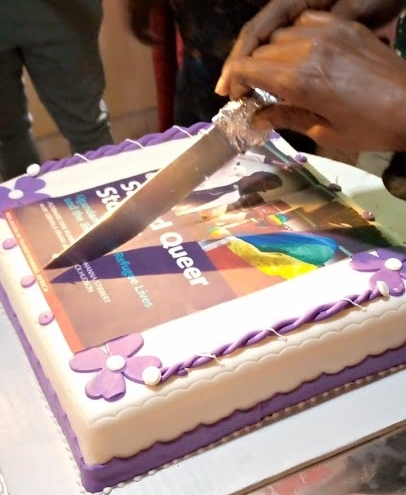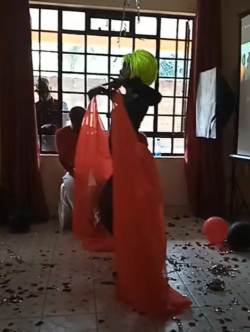When a book becomes a cake: the launch of Sacred Queer Stories

by Adriaan van Klinken
On Valentine’s Day 2022, the book Sacred Queer Stories: Ugandan LGBTQ+ Refugees and the Bible, was launched at The Nature Network (TNN), a community-based organisation of LGBTQ+ refugees based in Nairobi, Kenya. Sacred Queer Stories is a book about love – queer love that is contested yet reclaimed and celebrated. Is it too much to say that it also is a book of love? Certainly, the book was born out of a long-term friendship that grew between me and TNN founding member and leader, Raymond Brian Sebyala, since I first met them in 2015, and that expanded to include fellow community leader Fredrick Hudson, and my Leeds colleague Johanna Stiebert, and indeed the community of TNN as a whole – a friendship that developed into a collaboration and that now culminated in a Valentine’s baby we’re all so proud of, the beautiful Sacred Queer Stories book. This book presents the life stories of twelve refugees and gives an account of a very creative process in which the live experiences of LGBTQ+ refugees were put in a creative dialogue with bible stories which participants themselves identified as relevant and meaningful to them.
The launch of Sacred Queer Stories was a celebration of love and life, and it was a demonstration of a key point made in the book: that LGBTQ+ refugees, in spite (or perhaps because) of the difficult circumstances they live in, are incredibly resilient, talented, and joyful (what the French would call joie de vivre)! When I first suggested to Sulah, the current TNN leader, that I would be visiting Nairobi and wanted to present them a copy of the book and that we should have a small party to celebrate it, he said: ‘We don’t do small parties’. And he went on to organise a community event complete with delicious Ugandan food, stunning music and drag performances, and with drinks and dance till the late hours of the day.
Sulah, the organiser of the book launch
The programme started with a panel discussion in which not only the book authors participated, but also the famous Ugandan feminist and queer scholar and activist, Dr Stella Nyanzi, who many in the community fondly refer to as Mama Stella. Dr Stella - who wrote the foreword to the book - was the guest of honour at the event, joining us from Germany where she is currently in exile. Many queer studies scholars might think that this book is a little odd – wondering why on earth would you use the Bible to signify queer lives? Yet Dr Stella captured the significance of the book powerfully, when she elaborated on the creative and powerful re-telling of the bible story of Daniel in the Lions Den as a story that mirrors the experiences of migration and persecution, but also of survival, aspiration, and joy of life, that so many Ugandan and other African queer folk go through.

Dr Stella Nyanzi with a copy of Sacred Queer Stories
The celebratory book launch made me think about joint celebration as a key part of what in academic circles is known as ‘co-production’. Co-production has become an increasingly popular term in academia. Simply put, it refers to a research process in which knowledge is produced not primarily about, but with the community that is subject of it. Co-production of knowledge interrogates the hierarchy between academically trained researchers and their research participants, and therefore is a particularly suitable methodology for decolonial feminist and queer research. It acknowledges that participants are not just object of the knowledge that is generated, but are sources of knowledge themselves, and therefore share in the ownership of the project, its findings and outputs. Research participants, thus, become collaborators and co-owners.
Our project Sacred Queer Stories was designed in the spirit of co-production. Focused on the life stories of members of the LGBTQ+ refugee community based in Kenya, and the positive inter-action between these life stories with religiously authoritative texts from the Bible, the project was developed together with two community leaders, Raymond Brian and Fredrick Hudson. They served as local research coordinators and as facilitators of the project workshops, involving their community in the research process, and making use of already existing methods for community work developed in TNN. In this process, my colleague Johanna Stiebert and I quite literally took the backseat. The subsequent process of writing the book, Sacred Queer Stories, was led by Johanna and I, but we constantly relied on the input, advise and feedback from Raymond and Hudson, who on their turn shared the work in progress with the community. Their vital contribution is rightly recognised in them being acknowledged as co-authors of the book.
Raymond Brian (aka Mother Nature) joining the book launch virtually
Raymond and Hudson attended the book launch and participated in the panel discussion virtually, joining us from the USA, where they were recently resettled with the help of UNHCR. In their absence, current TNN leaders and members with great enthusiasm organised a big launch party to celebrate the Sacred Queer Stories book. It illustrates that the community as a whole was deeply invested in the project and felt ownership over it. Indeed, throughout the event, everyone kept referring to Sacred Queer Stories as ‘our book’. For me, the celebration is testimony to a successful co-production. As they say, the proof of the pudding is in the eating. Similarly, the proof of co-production research is in the community that is subject of the research celebrating the work and its outputs. When a book becomes a cake, and the cake is shared at a party, co-production culminates in celebration!

Maama Makemba performing at the Sacred Queer Stories launch
